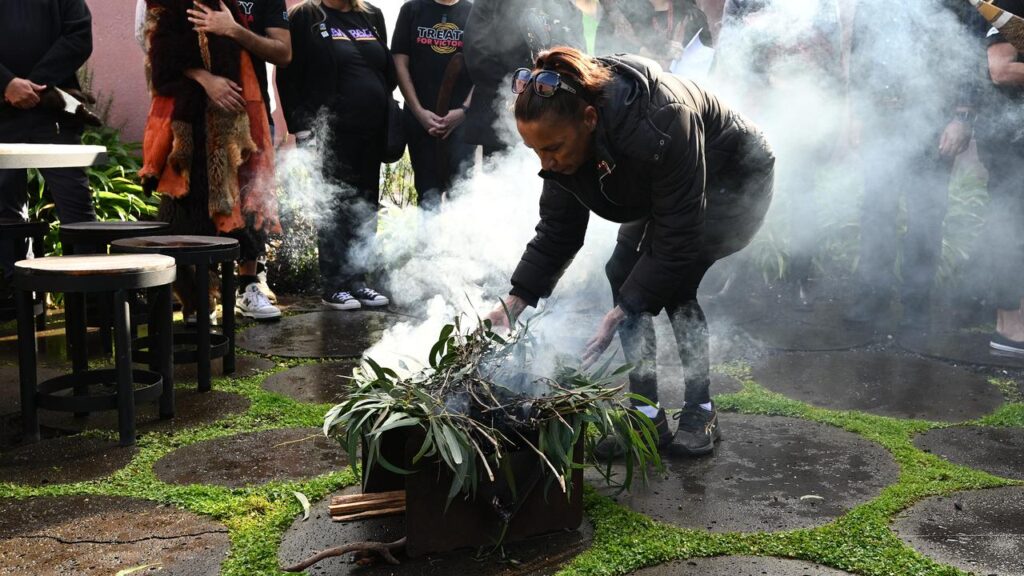Truth-telling inquiry splits on final report findings
Callum Godde |

An internal rift has overshadowed the landmark release of final reports from Australia’s first Indigenous-led truth-telling inquiry.
The Yoorrook Justice Commission’s final reports were tabled in Victorian parliament on Tuesday afternoon, in a potential watershed moment for improving Aboriginal people’s lives across the state.
The documents include a final report with 100 recommendations across five volumes and an official public record of Victoria’s history since colonisation.

The official public record features a disclaimer that three of the five commissioners – adjunct professor Sue-Anne Hunter, distinguished professor Maggie Walter and former Federal Court judge Anthony North – “did not approve of the inclusion of the key findings in the final report”.
“Yoorrook’s key findings draw from the conclusions presented in the commission’s existing reports,” the 454-page document reads.
“But (they) are limited in number in order to highlight the key events in Victoria’s colonial history that underpin the systemic injustice facing First Peoples in Victoria today.”
The disunity is a blow to the official public record, which has been discussed as a possible teaching resource in state schools as part of ongoing treaty negotiations.
None of the trio participated in deputy chair Travis Lovett’s “Walk for Truth”, a 500km journey from Portland in the state’s west to the steps of parliament house that wrapped up on June 18.

Some of the public record’s key findings are:
* Land now known as Victoria was not “discovered” by the British Crown or “founded” by settlers
* The sovereignty of Victoria’s First Peoples was never ceded and continues to exist
* The initial occupation was illegal, rapid and largely uncontrolled
* The taking of Country and resources was violent
* Laws and policies of the British and colonial governments were used to authorise the confiscation, theft, use and damage of lands and waters
* None of the wealth generated from the land and waters of First Peoples since colonisation has been directly shared with Traditional Owners
* Colonisation is not only a historic event and continues to affect First Peoples in Victoria to this day
* First Peoples in Victoria have a fundamental right to self-determination
* Treaty is the best pathway to self-determination and must include redress for the harms suffered as a result of colonisation
* Restitution, compensation, rehabilitation, satisfaction and a guarantee of non-repetition are options for redress

Commission chair Eleanor Bourke, who worked in the public service and education sectors for decades, said she had lived through many of the policies described in the pages.
“I know that change cannot be guaranteed,” she wrote in her foreword.
“However, First Peoples in Victoria now know that the truth of our history and our stories are on the public record.”
Yoorrook, which was given the powers of a royal commission when it was established in 2021, handed its final reports to Governor Margaret Gardner on June 25.
The commission held 67 days of public hearings, gathering the testimony of Stolen Generations survivors, elders, historians, experts and non-Indigenous advocates.
Its 148 recommendations will inform treaty talks between the Victorian government and the First Peoples’ Assembly of Victoria.
Premier Jacinta Allan said the government would carefully consider the final findings and recommendations.
“Victoria’s truth-telling process is a historic opportunity to hear the stories of our past that have been buried – these are stories that all Victorians need to hear,” she said.

Assembly co-chair Rueben Berg said the suggested reforms laid out a bold path to create a better future for Aboriginal people.
“Truth and treaty go hand-in-hand,” the Gunditjmara man said.
“Victorians know that we can’t keep doing the same thing and expecting different results.”
A statewide treaty agreement that includes making the assembly a permanent Indigenous voice to state parliament is nearing competition.
Treaty legislation is expected to be introduced to Victorian parliament later in 2025.
The state Labor government needs the support of up to six upper house crossbenchers for the bill to pass, with the coalition opposed to a treaty and state-based voice to parliament.
AAP